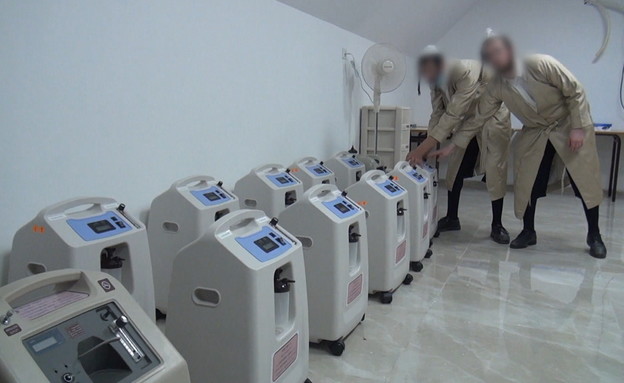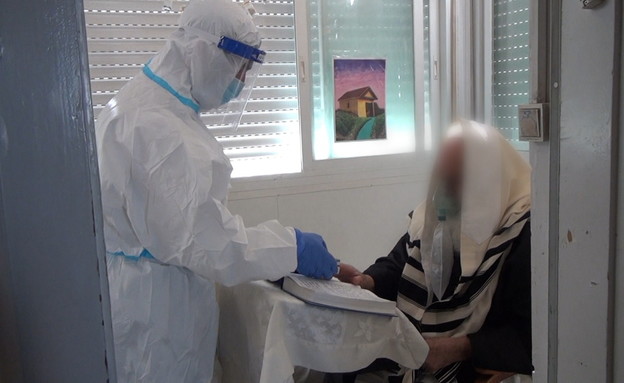Clandestine Chareidi Organization Treats Coronavirus Patients From Home- With Great Success

JERUSALEM (VINnews) — A hidden cellar in the Meah Shearim neighborhood in Jerusalem has become the headquarters for a clandestine battle taking place with COVID-19, according to a report by Mako’s Yair Sharki. The cellar holds some 220 oxygen machines which are lent out free of charge to sick persons who chose not to go to hospitals but rather to receive treatment in their homes. There are also tens of saturation machines used to measure the levels of oxygen in a patient’s blood.
A large supplementary apparatus of medical equipment, medicines, doctors and volunteers succeeds in monitoring, treating and providing all the requirements of patients who are sometimes in serious condition from coronavirus without the state of Israel even knowing about them. Remarkably, the success rate of these home treatments is significantly higher than in hospitals, due to a number of key factors.
The patients are closely monitored daily a few times a day by volunteers and visited by doctors cooperating with the voluntary organization. It is these doctors who decide when home treatment is not sufficient and the patient needs to be transferred to hospital. In many cases however, this is not necessary. The fact that a patient is in his home environment with his close family and devoted doctors caring for him and not totally isolated in a coronavirus ward can have a positive effect on his condition and can serve as a catalyst for his recovery. The organization feels strongly that the psychological benefits of home care outweigh the risks.

So far the organization had provided services for some 2000 patients since the outbreak of the virus and one volunteer, Arele, claims that only 10 or 15 required hospitalization and only 2 died during this period.
Arele adds that “during the past week we took care of a 76-year-old patient in serious condition. The volunteers came to him 3 to 4 times a day to evaluate his condition. During the first two or three days he couldn’t speak and had difficulty breathing. “We went through rough times with him. It is not clear that they would have done in hospital what we did with him, bringing doctors which cost a lot of money, but this is for a life and its worth it.”

Family members concur with the organization’s outlook and this is why they turn to it: “If we want him to continue living we need to go to the organization and not to hospital. He is elderly and they won’t pay attention to him. A hospital involves “fear of heights”, they haven’t got enough human resources.”
One of the doctors accompanying the treatments (who remained anonymous) said that “I’m not getting into the legal issue. I’m not a policeman, I’m a doctor who treats patients. I advise them to follow the directions. Our goal is not to enable people to bypass the law but rather to take some of the load off the system.This isn’t a state within a state or a separate system.”
Members of the organization however do see themselves as a kind of autonomous entity. “This is an autonomy, so what?” one volunteer says. “Did we steal something? Is there a risk? We only made a contribution.”
The phenomenon is not confined to the more extreme Chareidi sectors, even though the organization was established there. Radio anchor Avi Memran, a modern Chareidi from the Sefardic community, turned to them when his aged father fell sick with COVID-19: “Within half an hour a doctor came to my father with oxygen, an oxygenation machine, saturation, blood tests straight to the lab. They see the data, they make daily visits to see how he is progressing. Thank G-d my father recovered from coronavirus, which at his age is unusual.”
The organization’s willingness to go public demonstrates its belief that such modes of treatment should be copied by the general public as well. One of the volunteers concludes: “They can say what they want but we see here is saving lives. If they would do this nationwide, the hospitals wouldn’t collapse and it would be more effective and professional.”



